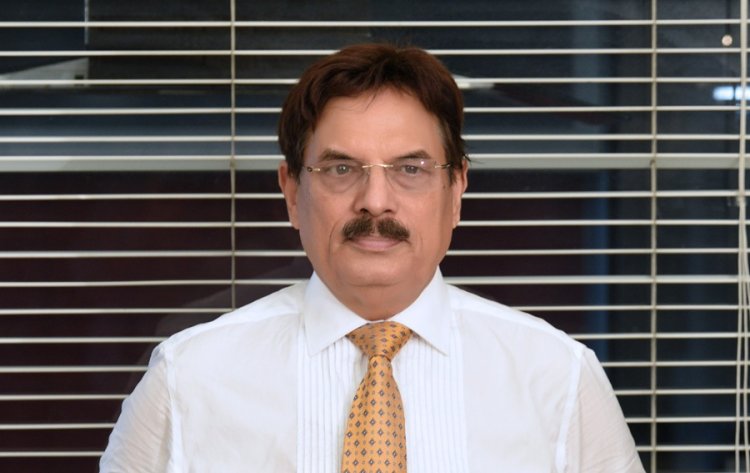We Can No Longer Ignore The Need To Protect Environment, The Time To Act Is Now: Eco Hotels
In an interview with ResponsibleUs, VK Tripathi, Executive Chairman of Eco Hotels and Resorts, discussed how hotels are contributing to combating environmental change and more

The hotel industry’s carbon emissions account for 1% of global emissions. The industry has already begun taking steps toward achieving net neutrality. With growing climate concerns, many hotels are adopting sustainable practices to reduce energy consumption, minimize waste, and enhance resource efficiency. Efforts such as energy-efficient buildings, renewable energy adoption, water conservation, and waste reduction are becoming standard as the industry strives to lower its environmental footprint.
In an interview with ResponsibleUs, VK Tripathi, Executive Chairman of Eco Hotels and Resorts, discussed how hotels are contributing to combating environmental change and more
Excerpts:
Eco Hotels' name itself reflects its purpose. Can you share the story behind its journey and the reasoning behind choosing this name?
We, as a company, have realised that the time has come to give serious attention to protect the environment. Many people still do not understand its importance. We tend to believe that everything is fine—we go out, breathe the air, and feel normal—until we fall ill and realize that oxygen levels have dropped, and air pollution has worsened.
Cities like Mumbai, the SpO2 level of even a healthy resident hovers around 95-96, which is concerning. The unclean environment is a major factor, and every day we struggle with foggy skies, where visibility is so poor that even close buildings are barely visible. In cities like Delhi, air quality levels have reached hazardous levels.
As our promoters are UK-based, they are even more aware of environmental concerns. In Europe, there is a strong emphasis on sustainability, which inspired this concept. However, while it's easy to conceive such ideas, implementing them is the real challenge.
The backbone of our concept is a new-build hotels that we are working on which will use 3D Volumetric Construction technology being developed by one of our group companies named Modulex. Although we, as an operating company, follow an asset-light model, we have developed a plan for overseas investors, which we call the EBOT model. This allows a 100-room building to be constructed in just 24 weeks.
How do you intend to achieve this goal?
We are aware that environment is a global issue and needs to be tackled globally. We are also aware that looking at the magnitude of the problem, it won’t succeed unless its turned into a movement. We have decided to spread this awareness at least among those who stay with us. We do have limitations when we take an existing building for operation as its infrastructure are already built. As a first step we have announce that our hotels are carbon neutral by prominently displaying this at all our hotels. We feel everyone who reads it will also spend at least a few seconds to think over it. Moreover, we every year we will carry out energy audit of all our buildings and will mitigate whatever carbon we emit either by buying carbon credit of through other environment protection mechanism.
The new built hotels which will use 3D volumetric construction technology will target the carbon net zero goals meaning thereby that carbon emitted during operations will be almost nil. Moreover, the 3D volumetric construction method allows entire rooms to be built in the factory—complete with furniture, fixtures, TVs, toilets, and other essentials—so that only 10% of the work needs to be done on-site. The finished rooms are simply lifted and placed in position. This technology emits 60% less CO2 than conventional building construction technology. In fact, based upon the way this technology works, I prefer to say that we don’t construct hotels. We manufacture them.
The sensors fitted in rooms as well as entire complex monitors energy usage in real time.
Can you elaborate on the reward system for guests who actively contribute to energy conservation?
Moreover, in future, we intend to undertake various activities to create consciousness about the environment. We may involve schools and colleges in the process and encourage them to undertake tree plantation initiatives which we may reward.
How do you plan to measure energy save by a guest?
This system will give us valuable insights. In fact, our sensors will also alert us if anything goes wrong anywhere in the hotel which way help us in undertaking an early repair. These multi-purpose sensors, powered by artificial intelligence (AI), will be interconnected, capturing real-time data.
Through our loyalty programs, we will keep guests informed about their contributions to sustainability. For instance, we will tell them how much CO₂ emissions they have helped reduce through their energy-saving efforts.
We are still working on developing the complete strategy and mechanism, but our goal is to create awareness that protecting the environment is not just the responsibility of the government—it is a shared responsibility for all of us.
Looking Ahead
Overcoming Energy Challenges
- To address this, we are in discussions with renewable energy companies to explore direct power procurement from sustainable sources.
- Our aim is to power our hotels with renewable energy, reducing dependence on electricity generated from coal, thermal, or other non-renewable sources.
The second step is that we have engaged an energy audit company to assess the carbon dioxide (CO₂) emissions from our hotels. They will conduct audits and inform us of our total emissions, despite our best efforts to minimize them.
The challenge then is how to offset the emitted CO₂.
There are two ways to mitigate these emissions:
Purchasing Carbon Credits
- In India, many organisations are generating carbon credits but lack buyers.
- Many companies do not know how to monetize these credits, and the government is working on a trading platform for carbon credit transactions.
Tree Plantation Drives
- I find tree plantations a more engaging and impactful solution.
- Organisations like Sadhguru’s initiatives along riverbanks and Parmarth Niketan in Haridwar are actively involved in afforestation.
We can work on some new initiatives, for instance, we may approach the government and request 20 acres of land from their forested areas that are not properly maintained. We could employ our own team, plant trees, ensure they are watered, and cover the entire cost of maintenance. This would become a part of our regular process. This is the way we can contribute to the world to survive clean.
The secondly, we can engage village Pradhans (leaders) to use Gram Samaj land, corner land, or any available land to plant trees. In return, we could provide financial support, which they can use for the development of their villages.
However, I do not yet know how carbon credits generated through above measures will be calculated. We are yet to evaluate how tree plantations initiatives will make us earn carbon credits. But I see this as a way to involve people in general and rural communities in particular, making them aware of environmental issues while also providing financial assistance.
The third idea is to involve schools and colleges more rigorously in plantation drives and reward them for their efforts.
All these efforts need to be converted into a movement. If we don’t turn this into a mass movement, it won’t have the desired impact. And that can only happen if we educate students about the importance of the environment and how they can contribute to nation-building.
[email protected]
What's Your Reaction?
















